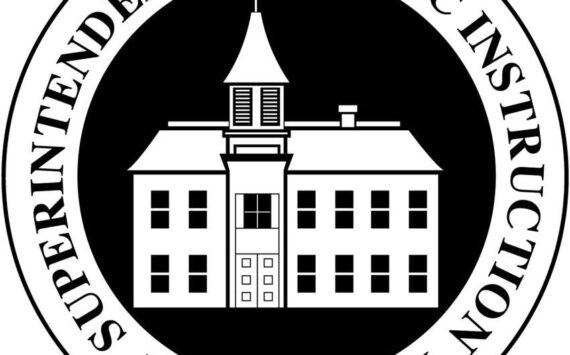TONASKET – The Tonasket School Board looked at worst-case-scenario budget savings goals for the 2009-2010 school year during their regular board meeting on Monday, April 27.
“We have not seen the final budget documents from the legislature,” Superintendent Randy Hauff said. “This is based on the Senate’s reduction of $671,000 and is just a preliminary document.”
The first goal regards savings not related to personnel. The largest possible items for reduction are reducing I-728 funded professional development by $52,402, reducing bus purchases by $96,060 which Hauff said would not affect the current depreciation schedule and the elimination of renovations of portables which would save the district another $40,000.
The second goal regards reducing administrative costs which the district will do when Arlene Johnson retires from Title I Administrator and Liz Stucker takes over those duties. This will save the district $40,554. The third goal regards extra-curricular services. If the district stops paying referee fees and instead has the ASB pay them, that would save the district $16,740.
“Historically, has the ASB had funds to do this?” Board Member Lloyd Caton asked.
“The district has only been paying these for about three years,” Hauff answered.
Another possible cut under the third goal would be to eliminate “C” team sports which would save the district $13,638.
“I have a problem with eliminating C teams,” Catherine Stangland, board chairwoman, said. “At the Washington State Summit, I heard if you put kids who are not doing well into three activities, their grades shoot up. So it seems to me that C teams are critical to that. I would be very reluctant to cut sports.”
Coaches Bob Thornton and Glenn Braman agreed with Stangland. Thornton said he has one boy on the track team who was failing three classes at the beginning of the season but is now only failing one and is working hard to bring the grade up while Braman said he has seen kids bring their grades up so they can stay eligible to play basketball.
“This is an important place that we really need to look at,” Stangland said. “This may not be the place to cut from if we can at all avoid it.”
The fourth goal regards reducing support services. The largest area of possible cuts under this goal would be saving $132,800 by reducing curriculum supplies and instructional materials. The district would also save $65,183 by reducing the elementary school counseling staff by one, though Hauff said all kids would still get their needs met. By eliminating the summer school program after this summer, the district would save $69,143. Another large reduction under this goal would be to eliminate the AmeriCorps program which would save the district $35,000.
The final goal regards moderately increasing class sizes to reflect state funding formulas. By eliminating the one-year contract for the math/language arts position at the middle school and high school the district would save $42,412. Through all five goals, the district would reduce their budget by $675,000.
Also during the meeting, the school board heard from some parents concerned about the high school’s policy this year that no students who were failing one or more class would be allowed to attend the prom.
“I’m against you trying to take my right to discipline my children away, but I think if you can find parents who don’t think they can discipline their kids, you should have them check a box on their admission forms to let the district do it for them,” Bob McDaniel said. “If a student comes to your class and you’ve done what you can to get their attention, then you should call their parents.”
Stephanie Hulse said that when she received the original letter stating that students who were failing one or more class wouldn’t be allowed to attend the prom, she wrote an impassioned letter to Principal Jeff Hardesty who she says responded just as passionately.
“I call it a punishment, he calls it an incentive,” Hulse said. “Incentives for good grades is great, but to take away the prom, which has to be planned for, by a temporary grade situation isn’t right. I support a lot of what the school does but I see no correlation between dances and grades. I think the idea was generated from a positive hope of getting kids on the right track, but this wasn’t the right way to do it.”
Delia Laurie said she doesn’t believe grades should be based through a computer system because she’s heard from some students who say teachers take up to two weeks to input grades sometimes and she has personal experience with a teacher who lost her son’s work. She also stated that she believes the school is taking away too many things that made going to school fun.
“There’s nothing left fun-wise in school and my son is at the point where if his friends weren’t there, he wouldn’t want to go anymore,” Laurie said. “The teachers have to do their job first in a timely fashion before privileges can be taken away. I don’t know what the solution is but we need to think it through more before taking away privileges.”
Teresa Webber said she believes the dances are times that bring everyone together and that the social aspect of a dance is very important for students. Jan McDaniel echoed Webber’s feelings.
“At the prom, nobody knows who’s dumb or smart, everyone is just beautiful or handsome for one night,” she said. “I don’t think this form of punishment is productive for our community. Their very best is all students can do.”
Once the public comments were done, Stangland addressed the parents, stating that when they have a problem with a teacher or a school policy, the first step is to talk to the principal of the school. If that doesn’t help the situation, the parents should then speak to the superintendent who will then bring the issue to the board.
“This is our procedure and this is what we ask everyone to do,” she said. “We always welcome everyone to come to board meetings, but normally we will not put something on our agenda until you’ve been through the procedure.”
A statement from Hardesty said the high school staff made the decision to formally attach academic performance to prom participation on March 18.
“I am proud to say that our efforts in helping students meet this new standard were both a success and a learning experience,” Hardesty wrote. “Upon our formal decision to create prom participation 31 percent (109 students of our 348) of our student body had one or more F’s. On the day of prom, 16 percent (58 students of 344) of the student body had an F in one or more classes. This growth can clearly be attributed to the efforts of our staff, to the support of the board and members of the community and to the directed focus of students. The data is connected to one variable – student engagement – and evidences that the staff has been deliberate and intentional.”
Finally, the school board welcomed new superintendent Paul Turner, his wife and his son to the meeting before Turner and the school board members signed his contract. Turner will take over as superintendent on July 1.
The next school board meeting will be on Monday, May 4 to go over the official budget.






